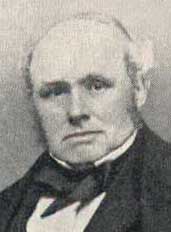 Robert Brook Aspland (January 19, 1805-June 21, 1869), son of Robert Aspland, succeeded his father’s as editor of the Christian Reformer and as secretary of the British and Foreign Unitarian Association. He was widely regarded as a powerful and forceful preacher and was nearly as dominant in denominational affairs as his father had been. Because of the influence of father and son, the years from 1805 to 1870 can be called the ‘age of Aspland’ in organisational Unitarianism in Britain.
Robert Brook Aspland (January 19, 1805-June 21, 1869), son of Robert Aspland, succeeded his father’s as editor of the Christian Reformer and as secretary of the British and Foreign Unitarian Association. He was widely regarded as a powerful and forceful preacher and was nearly as dominant in denominational affairs as his father had been. Because of the influence of father and son, the years from 1805 to 1870 can be called the ‘age of Aspland’ in organisational Unitarianism in Britain.
Robert was born in Newport, Isle of Wight. He was a classmate of young Benjamin Disraeli at Mr Potticary’s school in Blackheath. He later studied with Rev William Evans at Tavistock. After graduating from the University of Glasgow, Aspland attended Manchester College, York, 1822-26. There he studied for the ministry alongside James Martineau and John Relly Beard, two other giants of 19th century Unitarian ministry.
Aspland’s first chapel was at Chester, 1826-33. Next he was co-pastor with Lant Carpenter at Lewin’s Mead Chapel, Bristol, 1833-36. There he married Jane Hibbert. Together they started a boarding-school. His later ministries were at Dukinfield, 1837-58, and, following in his father’s footsteps, at New Gravel Pit Chapel, Hackney, 1858-69, where he inaugurated a new Gothic chapel. The Hackney congregation had been much divided by ministries after the senior Aspland’s death in 1845. The ‘new Aspland’ was hailed by its leaders as the man they had been hoping for. Nevertheless, due to the encroachment of industrial London and the consequent loss of the chapel’s leading inhabitants, the congregation continued to decline.
From the 1840s to the 1860s Aspland significantly influenced the Unitarian movement in Britain. In 1844 he played a major role in securing the passing of the Dissenters’ Chapels Act. In 1845 he took over the editorship of the Christian Reformer from his father, continuing it with considerable distinction until it closed in 1863. Aspland was a leading figure in administering Manchester College, 1846-57. In 1859 he became Secretary of the British and Foreign Unitarian Association, which his father had founded, and became the organisational leader of British Unitarianism. According to Edward Higginson, during his tenure as ‘practically the head of English Unitarians’, ‘[h]e steered [the BFUA] through many difficulties with rare tact and ability.’
When he left the governance of Manchester College Aspland stated one of his maxims: ‘In any case, where the relative interests of myself and others are in discussion, where there is a doubt, I always give it against myself.’
Aspland was a Bible-based Unitarian. He opposed James Martineau and John James Tayler, leaders of the new school of Unitarians who sought to base religion on instinct and emotion rather than natural and biblical evidences. Indeed, Aspland can be considered the leader, with Samuel Bache, of those Unitarians who took a conservative theological position. He played a calming diplomatic role, however, in fierce controversies over membership of the Association in the mid-1860s. One party wished to confine membership to those who accepted Unitarian doctrines of God and Christ; a second party hoped for a broader union of all liberal churches. Aspland did much to prevent the splitting apart of the Unitarian movement. His signal magnanimity was recognised at his death, when James Martineau, his old friend and deep theological opponent, gave the address at his funeral.
After 1867, until his death two years later, Aspland’s role was much reduced by ill health.
Robert Brook Aspland materials can be found at Harris Manchester College Oxford and in the records of the British & Foreign Unitarian Association and elsewhere in Dr Williams’s Library. There may be additional material in the records of the Chester and Duckinfield congregations. A memoir by Edward Higginson appeared in the Inquirer (3 July 1869). This was republished as a pamphlet (1869) and also appeared, together with James Martineau’s address at the internment, a few sermons by Aspland, and other memorial items, in Memoirs etc of the late Rev Robert Brook Aspland MA (1869). There is an entry for Aspland in the Dictionary of National Biography and there will be a new one by R. K. Webb in the forthcoming New Dictionary of National Biography, due to appear in 2004.
Article by Alan Ruston
Posted October 1, 2001